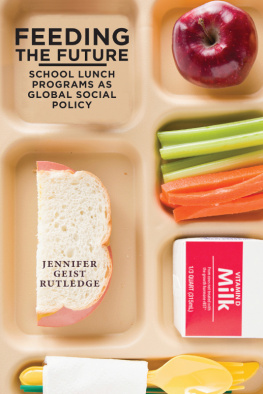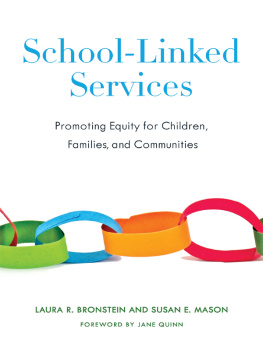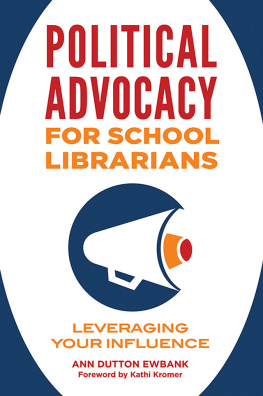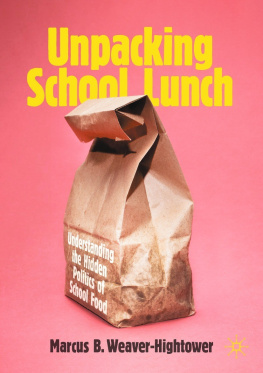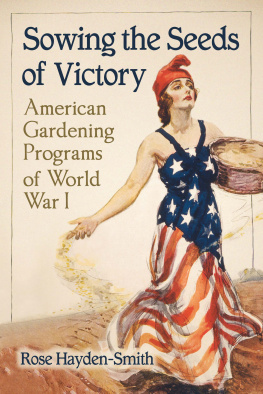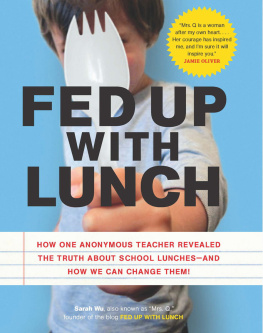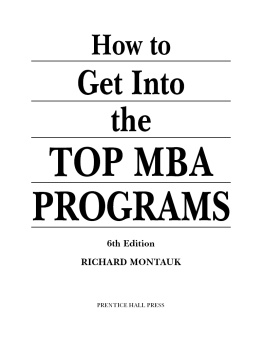Feeding the Future
Feeding the Future
The Emergence of School Lunch Programs as Global Social Policy
Jennifer Geist Rutledge
Rutgers University Press
New Brunswick, New Jersey, and London
Library of Congress Cataloging-in-Publication Data
Names: Rutledge, Jennifer Geist.
Title: Feeding the future : the emergence of school lunch programs as global social policy / Jennifer Geist Rutledge.
Description: New Brunswick, New Jersey : Rutgers University Press, [2016] | Includes bibliographical references and index.
Identifiers: LCCN 2015028637| ISBN 9780813573328 (hardcover : alk. paper) | ISBN 9780813573311 (pbk. : alk. paper) | ISBN 9780813573335 (e-book (epub) : alk. paper) | ISBN 9780813573342 (e-book (web pdf) : alk. paper)
Subjects: LCSH: School childrenFood. | School childrenNutrition. | School lunchrooms, cafeterias, etc.
Classification: LCC LB3475 .R88 2016 | DDC 371.7/16dc23
LC record available at http://lccn.loc.gov/2015028637
A British Cataloging-in-Publication record for this book is available from the British Library.
Copyright 2016 by Jennifer Geist Rutledge
All rights reserved
No part of this book may be reproduced or utilized in any form or by any means, electronic or mechanical, or by any information storage and retrieval system, without written permission from the publisher. Please contact Rutgers University Press, 106 Somerset Street, New Brunswick, NJ 08901. The only exception to this prohibition is fair use as defined by U.S. copyright law.
Visit our website: http://rutgerspress.rutgers.edu
For my mother, Gretel Geist Rutledge (19412015)
Contents
In the fall of 2005, I took a class called Family, Children, and the State with Daniel Kelliher at the University of Minnesota. This class, unusual in its focus for a political science PhD program, took seriously the overlap between families and the state and challenged us to consider the ways in which the state intervenes in and directly creates families. As an ardent gardener, I had become interested in school gardens, which were popping up all over Minneapolis and seemed like an easy solution to the problems of unappetizing school meals and obesity. In my seminar paper for that class, I explored the nascent efforts to challenge and transform the United States school lunch program. That paper was the seed of this book, as it focused my interests on how food policy can work as social policy, as well as the way in which families and states negotiate over the care of children.
Thus this project started, as so many first books do, as my dissertation. The book looks substantially different than the dissertation, having benefitted from several years away from the topic, an entire rethinking of the theory, a new focus on regional variation, and further field research. However, I wouldnt have made it to the book if I hadnt started with the dissertation, and as such I must thank Kathryn Sikkink, who shepherded that project. In addition, Sally Kenney and Ben Ansell were extremely encouraging and provided advice and assistance as I began to turn it into a book.
I was embraced by my colleagues at John Jay College and thank several of them for reading different versions of these chapters. In particular Susan Kang, Veronica Michel, Jack Jacobs, and Josh Wilson provided extremely helpful feedback on different parts of the book. Samantha Majic proved to be an extraordinary friend and critic and read and reread most of these pages.
Thanks are owed to Jane Bowers, provost at John Jay College, who funded my research trip to India, as well as the PSC-CUNY, which funded my research in Norway. During both trips, I was welcomed into the offices, homes, and schools of numerous people, all of whom helped shape my understanding of their countries histories, as well as the centrality of school meals to hunger reduction, education, culture, and family. This book would not exist in its present form without the many conversations I had on these two trips.
Of course, there is no book without a publisher, and Peter Mickulas saw promise in this project from the beginning. The reviewers he found were incredibly insightful and generous, and the book is much better because of them. I thank them and Peter for this. Parts of chapter 3 on the United Kingdom and chapter 4 on the United States previously appeared in History of Education, while the Norway case in chapter 3 was presented in much more detail in an article in Food, Culture, and Society. Both sections of the book are immeasurably better due to the anonymous reviewers for these two journals.
My wife, Autumn, read far more of this book than she ever wanted and did so with grace and a good eye for detail. I can never thank her enough for her support. Perhaps, though, the greatest thanks is owed to my mother. While initially surprised by the subject, she quickly became an enthusiastic supporter and even accompanied me on my research trips to Italy and India. In fact, in India she was quite the assistant, as many of my interviewees gravitated to this jolly, fleece-wearing lady, and she helped inject an ease into the conversations that might not otherwise have existed. She was diagnosed with terminal cancer one month after I received the book contract from Rutgers. I spent part of that fall sitting in hospital rooms with her, reading my revisions aloud to her, partly as an editing tool and partly as a diversion from the medical reality she was facing. If she was awake, she was a patient listener, although I think she wanted more fun stories and a little less social science. She passed away before the book was published. I am so grateful for her love.
Introduction
Today children in 151 countries receive free or subsidized school lunches. Yet just a hundred years ago, only a few local charities in a few European cities fed children. In other words, a program type that once was an occasional charity project exists today around the world as a common social benefits program. In particular, school lunch programs in developing countries are increasingly used as the primary method to address child malnutrition and encourage school attendance. Indeed, while other social benefits programs are under attack in both developed and developing countries, school lunch programs are well funded and have strong political support. This books question is one of social policy formation: how and why did school lunch programs emerge? Given that all countries developed education systems, why do some countries have these programs and others do not? Further, what explains the lasting prevalence of these programs?
The development of school lunch programs is a surprise when one considers the relative lack of social policy focused on children and the lack of attention usually paid to chronic malnutrition. The twentieth century charted new types of intervention by states and other organizations into the lives of families with the creation of the welfare state. However, with the exception of compulsory education systems, children over five were left out of the nascent welfare states. Paternalist welfare states were largely concerned with the problems of the working man, and those child benefits that did develop were designed to compensate workers for the cost of their child; other states were maternalist welfare states and focused on the needs of mothers and infants (Skocpol 1992). In both paternalist and maternalist welfare states, aside from the creation of educational systems, the needs of school-age children, particularly their physical needs, were generally left out of early welfare schemes.

